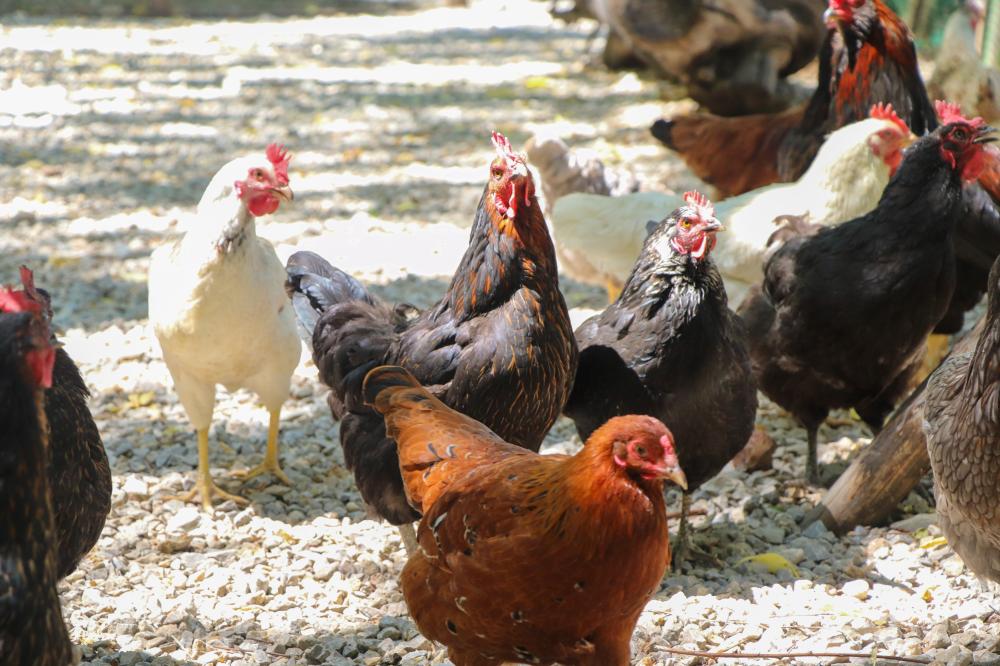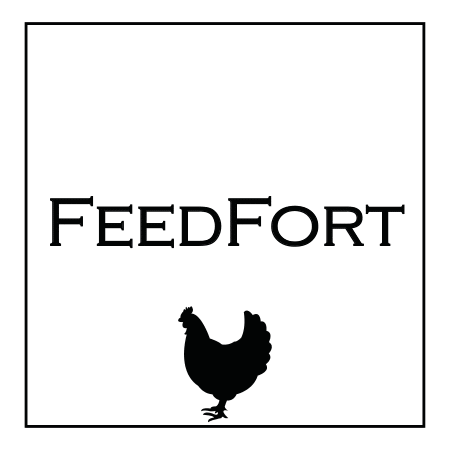Chicken Care Automation

Embracing Chicken Care Automation
As someone deeply entrenched in the world of chicken care, I’ve witnessed firsthand the revolution that is chicken care automation. It’s not just about making life simpler for the chicken keeper; it’s about elevating the level of care we provide to our feathered friends. The cornerstone of our approach at FeedFort is the patent-pending automatic chicken feeder, designed with the safety and security of your chicken feed in mind.
Our journey into creating an automated system was born out of necessity–the necessity to keep feed secure and to ensure that every grain of chicken feed was utilized efficiently, without waste or the risk of disease from unwanted pests. We harnessed the power of photocell technology, allowing our feeder to respond to the natural light cycle, opening with the morning sun and closing as dusk falls.
The benefits of automating chicken care practices extend far beyond convenience. They touch on the health and well-being of the chickens themselves, affecting everything from feeding routines to protection against pests and diseases. Let’s delve deeper into how automation like ours is transforming the landscape of chicken care.
Revolutionizing Feeding Practices
Automatic Feeders: The Backbone of Chicken Care Automation
Feeding chickens is an art as much as it is a science. It’s about ensuring that your flock has access to fresh, nutritious feed throughout the day without overfeeding or wastage. Our FeedFort feeders embody this balance beautifully. By incorporating durable American-made 5052 Aluminum, we’ve crafted a feeder that withstands the elements and keeps out rodents, effectively reducing the risk of disease transmission to the flock.
Benefits Beyond Simple Feeding
But the utility of automated feeders doesn’t stop at simply doling out feed. The design features a slow descent, minimizing spillage and promoting a more orderly feeding process. This not only helps in keeping the feeding area clean but also ensures that every pellet is consumed as intended, ultimately leading to savings on feed costs.
Enhancing Overall Well-Being
Reducing Stress for Healthier Chickens
Stress in chickens can lead to a myriad of health issues, from reduced egg production to increased susceptibility to disease. A consistent feeding schedule, made possible through automation, provides a routine that chickens come to rely on, reducing stress and improving overall health.
Keeping Predators and Pests at Bay
One of the less discussed but equally important benefits of chicken care automation is the reduction in pests and predators. Traditional feeding methods can attract unwanted visitors, from rats to raccoons. Automated systems like the FeedFort feeder are designed to only provide access to chickens, ensuring that feed is for the intended recipients only.
Sustainable and Efficient Chicken Care
Sustainability is at the heart of automation. By precisely measuring out feed and reducing waste, automated systems ensure that resources are used efficiently. This not only has positive implications for the environment but also for the bottom line of chicken keepers, who can see significant savings over time.
In our quest to make chicken care both efficient and sustainable, we’ve seen firsthand the difference that a high-quality automated feeder can make. From improved chicken health to reduced feed costs, the benefits are clear. However, chicken care automation doesn’t stop at feeding; it’s a comprehensive approach that includes water management, egg collection, and even coop cleaning.
Integrating Technology into Chicken Coops
Innovations in Coop Design
The modern chicken coop is a marvel of engineering, incorporating technology designed to improve the lives of chickens and keepers alike. From automatic doors that close securely at night to protect from predators, to ventilation systems that ensure a constant flow of fresh air, technology plays a pivotal role in today’s coop designs.
The Role of Monitoring Systems
Another aspect of chicken care automation is the integration of monitoring systems. These systems allow keepers to keep a close eye on the environment within the coop, adjusting factors like temperature and humidity to create the ideal conditions for their flock.
The Future of Chicken Care
Looking ahead, the future of chicken care shines brightly with the prospects of further automation and technological advancements. Imagine a world where coops are fully self-cleaning or where feeders automatically adjust the type of feed based on the nutritional needs of the flock. This future isn’t as far off as it might seem.
At FeedFort, we’re on the cusp of these innovations, constantly exploring new ways to enhance the chicken keeping experience through automation. Our vision is one where chicken care is not only easier but also more effective, ensuring happier, healthier chickens and, by extension, happier chicken keepers.
Embracing the Shift Towards Automation
In conclusion, chicken care automation is not just a trend; it’s a meaningful shift towards more humane, sustainable, and efficient farming practices. By embracing this shift, keepers can enjoy not only the tangible benefits of healthier flocks and lower costs but also the intangible peace of mind that comes with knowing they are providing the best care possible.
As we continue to innovate and push the boundaries of what’s possible in chicken care, we invite you to join us in this exciting journey. Together, we can transform chicken keeping into an endeavor that’s as rewarding for the keepers as it is beneficial for the chickens.

What is Chicken Care Automation?
Chicken care automation is revolutionizing how we care for our feathered friends by incorporating technology into their daily management. Imagine not having to wake up at the crack of dawn to feed your chickens or worry about whether they’re safe from predators at night. That’s what automation offers. At its core, it includes automatic feeders, waterers, coop doors, and even monitoring systems that track the health and safety of the flock. By leveraging technology, we can provide consistent care, reduce manual labor, and enhance the overall well-being of the chickens. It’s about using smart solutions to create a more efficient, stress-free environment for both chickens and their keepers.
How Does the FeedFort Feeder Prevent Rodents from Accessing Chicken Feed?
The FeedFort feeder is ingeniously designed with security in mind. It utilizes durable American-made 5052 Aluminum which is not just sturdy, but also forms an impregnable barrier against rodents and pests. The magic lies in the mechanism activated by photocell technology. As daylight fades, the feeder automatically closes, securing the feed from nocturnal pests. Its slow descent feature minimizes spillage, which often attracts unwanted guests. This approach is not only about keeping the feed safe but also about promoting a hygienic environment for your chickens, reducing the risk of disease transmission.
Can Automation Improve the Health of My Chickens?
Absolutely, automation can significantly enhance the health of your flock. Consider the stress factor; a consistent, reliable feeding and watering schedule can greatly reduce stress among chickens, which is a common cause of health issues. Automation ensures they have access to fresh water and feed without the inconsistencies that manual care might introduce. Moreover, by keeping the coop environment clean and safe from predators and pests, you’re reducing the risk of disease and promoting healthier living conditions. It’s about creating a controlled environment where your chickens can thrive, laying the foundation for better overall health and increased egg production.
Are Automated Systems Difficult to Install and Maintain?
Many people imagine that incorporating technology into chicken care must be complicated, but that’s not the case. Our automated systems are designed with the user in mind. Installation is straightforward, often requiring just a few simple tools and some basic DIY skills. Maintenance is similarly easy. The systems are built to be durable and long-lasting, with minimal need for upkeep. Regular checks and occasional cleaning are all that’s needed to ensure they continue to function effectively. We provide clear instructions and support to help you every step of the way, making the transition to automated chicken care as smooth as possible.
What Future Innovations Can We Expect in Chicken Care Automation?
The horizon for chicken care automation is incredibly bright. We’re on the cusp of innovations that could further revolutionize how we care for poultry. Imagine feeders that not only dispense feed but also analyze the nutritional needs of your flock and adjust accordingly. Or coops equipped with environmental controls that automatically adjust temperature, humidity, and ventilation for optimal comfort. Advances in monitoring technology could even offer real-time health assessments, alerting you to potential issues before they become serious. At FeedFort, we’re exploring these and other possibilities, always with the goal of making chicken care easier, more efficient, and more effective.
How Can I Ensure That Automation Does Not Compromise the Natural Behavior of My Chickens?
It’s essential to strike a balance between leveraging technology and allowing chickens to express their natural behaviors. Automation should enhance, not replace, the natural environment of the coop and run. For instance, automatic doors can be timed to coincide with natural daylight hours, supporting the chickens’ natural wake and sleep cycles. Feeders and waterers should provide consistency without removing the opportunity for chickens to forage and peck as they naturally would. Incorporating elements into the coop and run that encourage natural behaviors, such as perches, dust bathing areas, and varied terrain, can ensure that your chickens enjoy the best of both worlds. Remember, the goal of automation is to support and enrich the lives of your chickens, not to create an entirely artificial environment.
Chicken Care Resources
- Poultry Hub – Feeding and Nutrition in Poultry – A comprehensive guide to feeding practices and nutrition for poultry, including information on the importance of a balanced diet for optimal chicken health.
- University of Minnesota Extension – Poultry Nutrition and Feeding – Resources and articles on poultry nutrition and feeding practices, covering topics such as feed ingredients, feed formulation, and feeding strategies.
- National Chicken Council – An organization dedicated to promoting and protecting the interests of the chicken industry in the United States, providing valuable insights into best practices for chicken care and management.
- University of Maryland Extension – Managing Poultry Pests Naturally – Information on natural and sustainable ways to manage pests in poultry facilities, helping to protect chickens from potential health risks.
- American Veterinary Medical Association – Guidelines for Euthanasia of Animals – Guidelines on humane euthanasia practices for animals, including poultry, to ensure ethical and compassionate end-of-life care.

